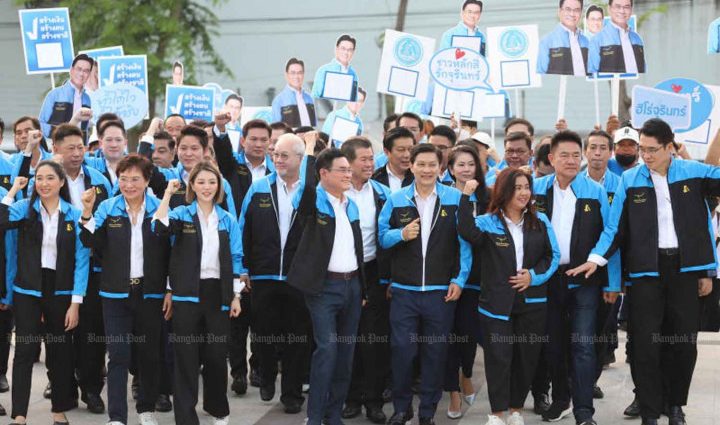Pheu Thai ups goal, BJT backs pot push

The Democrat Party has proposed financing its economic policy using one trillion baht drawn from unspent funds kept by various state agencies.
The party is set to unveil the policy formally on Monday. Kiat Sitthi-amorn, a member of the party’s economic team, said if the money is drawn from unspent funds, there will be no need to take out a loan to cover it.
The money could also be raised through issuing of bond, he added.
In another leg of the policy, Mr Kiat said the party was also looking to make it possible to allow members of the Government Pension Fund (GPF) and provident fund to tap into 30% of their contributions for refinancing their home mortgage. Members of the GPF are state officials while those belonging to the provident fund are private-sector employees.
The Democrat’s economic team, chaired by former deputy finance minister Pisit Lee-artham, comprises prominent members including Mr Kiat and former deputy Bangkok governor Samart Ratchaphonsit.
Among the party’s other election promises are a price guarantee of key cash crops, allocating two million baht each to community banks nationwide, free internet connections to every village, free tuition fee until bachelor’s degree, a fund to support small-and-medium-sized enterprises (SMEs), and the distribution of agricultural land for landless farmers.
Mr Kiat added the Democrats would also tackle high energy prices by reducing oil refinery costs, and bring down the fuel tariff (Ft) which adds to household electricity bills, and cut the price of freight transport.
Target up
The Pheu Thai Party should bump up its House seat target, yet again, from 310 to 376, according to its prime ministerial candidate Srettha Thavisin.
At a campaign rally in Nan on Sunday, Mr Srettha, the party’s No.2 prime ministerial candidate, said the Pheu Thai’s policies were designed to lead the people out of what he calls a “poverty black hole”.
He said the party’s economic plans were new, including the proposed 10,000-baht “digital money” giveaway unveiled recently. He said if Pheu Thai ran the next government, it also would seek the listing of Nan as a World Heritage site (WHS) and as a twin city of the WHS-listed Luang Phrabang, a cultural city in Laos.
Mr Srettha said the party would also upgrade Nan airport into an international one, establishing a direct air link between the province and Luang Prabang. Nan, where Pheu Thai leader Dr Cholnan Srikaew is contesting the May 14 poll, is also affected by the PM2.5 fine dust pollution. Pheu Thai suggested that instead of burning corn cobs, which contributes to the haze, farmers should turn them into animal feed or fertiliser for sale.
Mr Srettha told supporters: “Dr Cholnan has set the target of 250 to 310 House seats. I don’t think it will be enough. We need at least 376 seats so we can govern [the country] solo and take care of all ministries ourselves.”
Partnership option
The Public-Private Partnership (PPP) may be the best method of driving new state projects at a time when tax rises are not feasible, according to the Palang Pracharath Party (PPRP).
Narumon Pinyosinwat, treasurer of the ruling PPRP, said the party’s policies were realistic and practical. They were not intended only as a tool for electioneering. However, she recognises limitations in collecting more taxes or borrowing more as a way to secure funds to finance new state projects.
Obtaining loans is also not possible as the government’s borrowing has hit the public debt ceiling. She said one viable method was for to establish a PPP to undertake state projects. Alternatively, funds may be mobilised through the stock market and spent on development and rehabilitation purposes, such as supporting start-up businesses or social enterprises.
Ms Narumon said the PPRP’s election promises were sustainable, long-term policies. “We [political parties] shouldn’t be competing over who is better at spending money without mentioning how to generate the revenue. “We can’t keep on talking about splurging,” she said.
Weed merit
The Bhumjaithai Party has defended its flagship cannabis decriminalisation policy and offered to improve welfare for the elderly.
Prominent party figures addressed a packed campaign meet in Chiang Rai on Sunday. Bhumjaithai leader Anutin Charnvirakul took to the stage to defend making cannabis legal for medical use and for research.
Deflecting attacks on the party’s flagship policy, he insisted that putting cannabis to constructive use would pay dividends. “As a party, we don’t restrict people’s chances to get something better,” he said.

